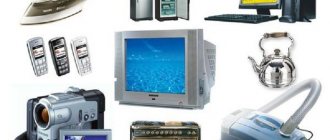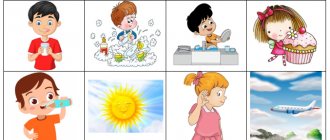Article:
Child according to the structure of speech impairment: OHP level 3
Age: 6 years
The date of the:
Lesson topic: sound R.
Goal: automation of the sound R in syllables, words, sentences.
Tasks:
- consolidate the correct pronunciation of the sound R in syllables, words and sentences
- strengthen the ability to coordinate numerals with nouns
- strengthen the ability to make sentences based on pictures.
Planned results of the lesson: correct pronunciation of the sound R in syllables, words and sentences.
Equipment: articulation gymnastics cards, game picture material, mirror, echophone, ball.
Progress of the lesson:
1. Organizational moment (2-3 min)
Speech therapist: - Hello (says the child’s name). (Hello).
Speech therapist: - Listen carefully to the poem that I will read.
Somehow early in the morning
A gloomy crayfish digs a hole.
Cancer would be glad not to dig it,
But you have to live somewhere.
Cancer is reluctant to work,
He is not happy with his work.
Speech therapist: - Tell me, please, what sound did I highlight in my voice? (Sound R). That's right, today we will practice pronouncing the sound R correctly.
2. Main part (18 min)
A. Articulation analysis.
Speech therapist: - Let's remember how we pronounce the sound R? What's happening to your lips? Are your lips stretched into a smile? Are your teeth visible? Yes. The mouth is slightly open. Where is the tongue located? Behind the upper teeth. The tongue is trembling.
b. Articulation gymnastics.
Speech therapist: - First, let’s prepare our tongue. Let's do the exercises in front of the mirror.
“Swing” - the tongue swings up and down.
“Horse” - the horse is galloping, its hooves are clattering.
“Painter” - and now let the tongue work as a painter and paint the sky-ceiling (stroke the hard palate with the tip of the tongue, making movements back and forth).
“Drummers” - imagine that your upper teeth are a drum, and your tongue is a drummer. Tap your tongue behind your upper teeth from the inside, clearly saying: D-D-D...
“Football” - a breeze has arrived, he wants to play football. This is the ball. Get the ball into the goal. (Stretch your lips with a tube and blow on the cotton wool, trying to drive the ball into the goal. The stream of air should be continuous and long).
V. Pronouncing an isolated sound.
— Shall we play wizards? One, two, turn into animals. Draw an angry tiger and show how menacingly it growls (Rrr). Picture a woodpecker sitting on a tree and how he knocks on the tree (Pur-r-r, tr-r-r.) Picture how an affectionate cat purrs (Pur-r-r-r.) Well done.
d. Automation of the sound P in isolation and in syllables.
Game "Catch the Sound"
Speech therapist: - Clap your hands when you hear the sound R.
a) at the level of a number of sounds: R R N G R Z R R R V R D R F M R R R
b) at the level of a number of syllables: RA-LO-PO-RU-WE-OR-VA-RA-RY-KO-RU-AR
c) at the word level: watermelon, window, kefir, mosquito, sky, backpack, loaf, rocket, robot, glass, mole, axe, house, fire.
Game "Echo"
Speech therapist: - Take the microphone. Listen carefully and repeat after me.
| RA-RA-RA RU-RU-RU | RO-RO-RO RY-RY-RY | AR - OR - AR OR - AR - OR |
| RA-RO-RU RO-RY-RA | RY-RU-RA RU-RA-RO | OR - IR - OR UR - AR - UR |
d. Physical education minute
Speech therapist: - I suggest you warm up a little.
Snow was falling on the threshold (slowly hands up and down)
The cat made himself a pie. (press our palms together - make a pie)
In the meantime, I sculpted and baked,
The pie flowed away like a stream. (fingers of both hands ran across the table)
Bake some pies for yourself (we press our palms together and make a pie)
Not from snow - from flour.
e. Automation of the sound [P] in words and phrases.
Game "Rhinoceros Postman"
Speech therapist: — The rhinoceros postman delivers letters, but we recognize who they are from from the picture.
Rhino delivers letters from...
Game "Stargazer"
Speech therapist: - Light up stars in the sky, naming the picture on the back.
Speech therapist: - Choose a star. Count the object in the picture to five.
and. Automation of the sound R in sentences.
Speech therapist: - Look at the pictures and answer the questions:
-What is the crow doing? (Crow assembles a pyramid)
-What does the trumpet player do? (The trumpeter blows the trumpet)
— What does the drummer do? (Drummer drums the drums)
- What is Pinocchio holding in his hands? (Pinocchio holds a notebook and pencil in his hands)
— What is Roma doing? (Roma jumps over the stream)
-What is Raya doing? (Raya holds a basket of fruit in her hands)
3. Lesson summary (2 min)
Speech therapist: - Well done, Lera! Well done. Tell me, what sound did we learn to pronounce correctly?
Long-term planning of work with children 3-4 years old with general speech underdevelopment of levels 1 and 2
In addition to classes for the development of understanding of speech, active speech, the formation and improvement of the grammatical structure of speech, the development of verbal communication and coherent speech, games, exercises, and classes are conducted for the children of the group to develop auditory attention, phonemic hearing and perception, visual attention and perception, the prosodic aspect of speech , education of general speech skills.
In such classes, children learn to recognize and distinguish non-speech sounds and sound signals consisting of 3-4 words of sounds; a sense of rhythm, auditory-verbal memory, visual memory and attention develops; children develop correct speech diaphragmatic breathing and long speech exhalation; Speech imitation, intonation expressiveness, and rhythm of speech develop.
Throughout the first year of study with children with
OHP 1 and 2 levels, the teacher carries out targeted work on the development of articulatory motor skills, fine motor skills and the psychological basis of speech.
For working with children, complexes have been selected that combine exercises aimed at developing articulatory motor skills, fine movements of fingers, breathing, voice, and the development of the child’s emotional sphere. Complexes are associated with lexical material accessible to children. The game form of teaching the material is most consistent with the psychological capabilities of preschoolers.
Exercises to develop articulatory and fine motor skills are carried out daily so that the motor skills developed by children are consolidated and become stronger. The work takes at least 5 minutes. Articulation exercises are performed in front of a mirror, sitting on a chair, as shown by an adult in stages. The execution of the exercise is also checked step by step.
An important stage of correctional and developmental work in a group is the individual work of the teacher with the child.
Individual work is carried out after subgroup classes and children’s rest. The duration of individual lessons does not exceed 10 minutes. Planning is carried out on the basis of the examination of the child, the recommendations of the State Medical Inspectorate and the psychologist. During the year, two types of individual work planning are used: long-term (for the whole year) and calendar-perspective (for one month). This contributes to more in-depth and high-quality work with each child throughout the school year. Such planning makes it possible to take into account the characteristics of the child’s speech and mental development, consolidate the material covered, and determine the dynamics in development.
It is impossible to talk about the success of correctional and developmental work in a speech therapy group without close contact between the teacher and the parents of preschool children and without their parents’ help. Introductory conversations are held with the parents of the pupils; messages and consultations are offered at the parent corner stands; parents are invited to individual conversations regarding the state of their children’s speech development; are actively involved in the educational and development process.
Diagnostics
A comprehensive examination of a preschooler with speech disorders is carried out. Conclusions from a speech therapist, neurologist, and child psychiatrist will be required. The OHP diagnostic route consists of several stages:
- A conversation with parents to collect anamnesis and find out the possible cause of the speech defect.
- Assessing the level of development of a child’s speaking skills.
- Exclusion or confirmation of concomitant diseases, developmental delays.
- Studying the structure of the speech apparatus to detect organic disorders.
The final diagnosis is made based on the conclusion of the consultation. To send a child to a speech therapy kindergarten, it is necessary to undergo a PMPK. The commission must submit a reference for a preschooler from a preschool educational institution or from a psychologist. They will have a conversation with the child and parents and give recommendations on subsequent education. The program of individual work in accordance with the requirements of the Federal State Educational Standard will be drawn up by a teacher of the educational institution.
Treatment of OHP is a labor-intensive process. You cannot rely only on preschool teachers; be sure to do extra work at home, talk to your child more and listen to his statements.
Causes
The characteristics of level 2 OHP indicate the polyetiological nature of the speech defect. That is, physical, biological and social prerequisites become the culprit for the development of the disorder. The main provoking factors are:
- fetal hypoxia;
- Rh conflict between mother and child;
- birth asphyxia;
- head injuries received at birth and in the first year of life;
- infections with neurotoxicosis;
- perinatal encephalopathy;
- pedagogical neglect;
- communication deficit;
- heredity
- separation from home, or hospitalism syndrome.
Often, OHP is a consequence of a complex of causes. This is important to consider when diagnosing and correcting a speech defect.






